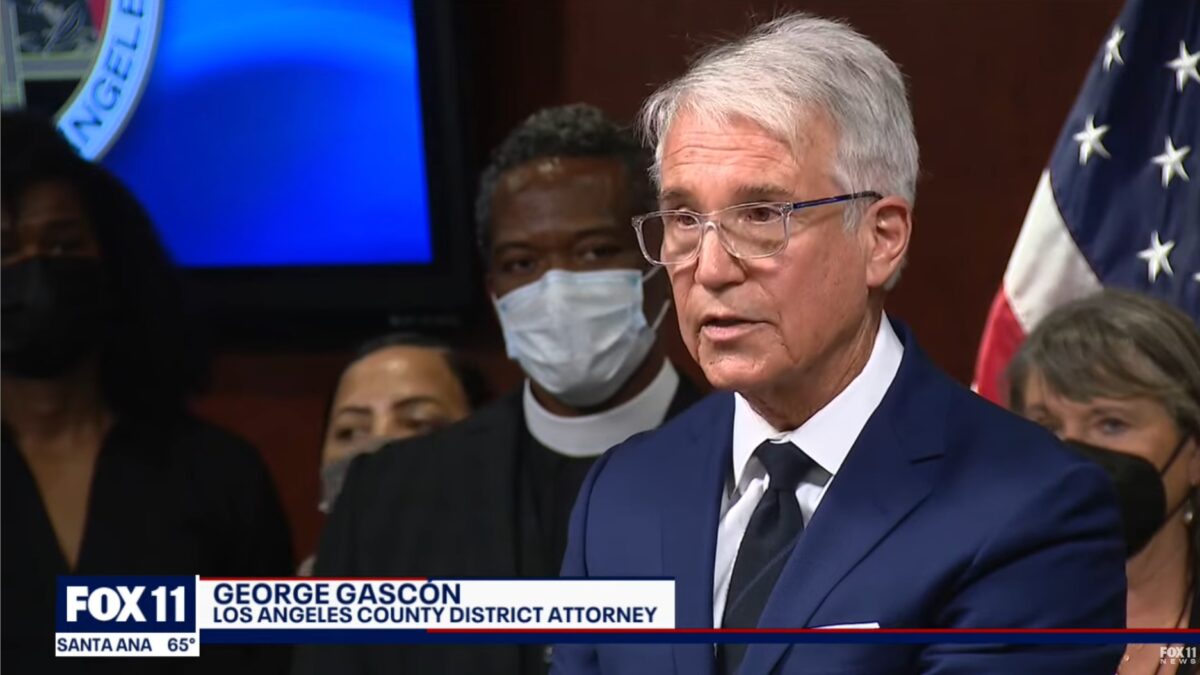After its push to oust L.A. County District Attorney George Gascon failed because nearly 200,000 petition signatures were invalidated, the campaign to recall Gascon announced it is filing for injunctive relief after an initial review showed 39 percent of the signatures invalidated by the L.A. County registrar were likely wrongfully rejected.
“The initial review of invalidated signatures demonstrates the Registrar’s counting process was seriously flawed, resulting in substantial errors, the wrongful invalidation of many valid signatures, and the disenfranchisement of thousands of Los Angeles County Voters,” the campaign wrote in a press release.
After the California county’s registrar-recorder, Dean Logan, rejected the campaign’s recall petition over an insufficient number of valid signatures (Logan determined the petition had only 520,050 valid signatures, a figure just short of the 566,857 they needed), volunteer attorneys began conducting a review of the invalidated signatures. They identified legitimate challenges for 39 percent of the invalidated signatures reviewed so far.
Examples of improper invalidation by the registrar include:
- Signatures “invalidated as ‘non-matching’ despite showing substantial similarities to the signatures on file.”
- Signatures invalidated as “not registered” despite the signature belonging to a registered voter.
- Signatures “incorrectly invalidated as ‘duplicates’ without the Registrar counting at least one of the alleged duplicates as required by law.”
- Signatures invalidated over confusion regarding changes to voters’ addresses.
The recall campaign also claims that the L.A. County registrar placed arbitrary limits on the campaign’s review process, limiting review hours, the number of reviewers, and “access to information necessary to determine” the validity of a signature. It will take more than a year for the volunteers to review all the invalidated signatures under those limitations, the recall effort claims. The campaign is filing for injunctive relief to seek expanded access.
In addition to claiming improper signature invalidation, the campaign also argues that L.A. County’s voter rolls were “artificially inflated” by 208,000 to 515,000 ineligible names at the time the number of signatures required for the recall was determined (10 percent of all Los Angeles County registered voters).
Had L.A. County been actively maintaining its voter rolls, there’s a good chance the recall petition would have gone through, even with the rejected signatures.
“The original requirement of 566,857 signatures to qualify (based on bloated voter rolls showing 5,668,569 active voters at the time) should have been set anywhere from 515,357 to 546,357,” according to the press release. “This issue alone could substantially affect the outcome of the recall given that the Registrar has already identified what it deems to be 520,050 valid signatures.”
This isn’t the first time L.A. County has been criticized for failing to clean its voter rolls. Back in 2019, California and Los Angeles County agreed to purge as many as 1.5 million ineligible voters from its rolls after Judicial Watch filed a lawsuit arguing the Golden State and its biggest county were not complying with federal law requiring the removal of inactive registrants.
“If I were interested in Los Angeles, I would be dredging the records of list maintenance through the NVRA [the National Voter Registration Act, a federal law that governs voter registration and removal] to see how responsive they’ve been to the Judicial Watch lawsuit settlement, because they’re under some kind of obligation already,” President of the Public Interest Legal Foundation J. Christian Adams told The Federalist.
Adams has spent 10 years litigating voter roll maintenance and other election integrity-related cases. Most recently, PILF has filed six complaints surrounding 515 duplicate voter registrations in six Minnesota counties. The nonprofit law group also filed a lawsuit against Michigan Secretary of State Jocelyn Benson for her failure to remove nearly 26,000 dead registrants from Michigan’s voter rolls.
Due to an 11th Circuit Court decision that refused to accept the inflated voter roll theory, Adams recommended the recall campaign instead find the ineligible registrants — duplicates, deceased, those that have moved, etc. — on L.A. County’s voter rolls, just like what PILF does.
“They need to be doing the analysis, and not just the math,” Adams said. “Because the courts have foreclosed the math part.”
While it looks like many Democrat-run cities — Los Angeles, Philadelphia, Detroit — are plagued by inflated voter rolls (and many critics rightly blame nefarious political operatives), Adams believes it’s because there are more renters than property owners in cities, thus more people move around and fail to change their voter registration.
“The NVRA does not let you remove people who are ineligible at the pace that they’re coming onto the rolls,” Adams said. “That limits your ability to take people off with the same amount of speed they’re moving.”
Although voter roll maintenance can be a slow and arduous process for municipalities, Adams still emphasized the importance of maintaining accurate records.
“This [Gascon recall petition] is the first time I’ve heard of bad list maintenance potentially impacting a signature drive,” Adams said. “In all the years I’ve worked in this space I’ve never contemplated how having ineligible voters on your rolls makes it harder for people to get enough signatures in a place like California. It’s a big deal.”








